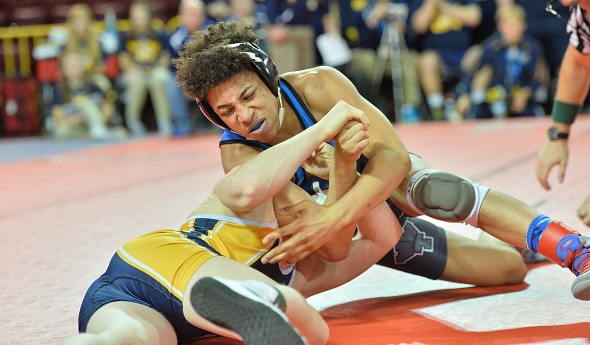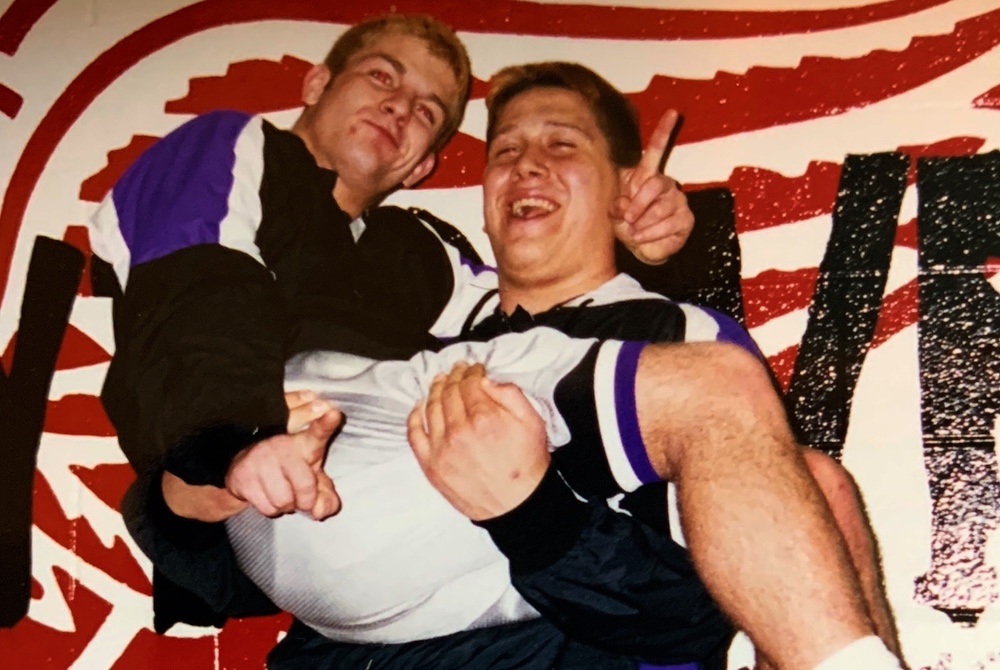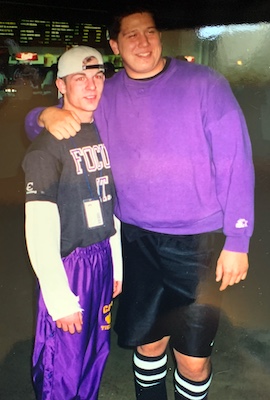
Titans Grow to Tower Over Competition
By
Tom Markowski
Special for Second Half
January 19, 2017
WARREN – The year was 1999. Greg Mayer had recently graduated from Central Michigan University and didn’t know what he wanted to do with his life.
 After serving as a co-head wrestling coach at Warren Woods Tower in 1998, Pat Threet directed the program alone the following season.
After serving as a co-head wrestling coach at Warren Woods Tower in 1998, Pat Threet directed the program alone the following season.
Although they never had met before, Mayer and Threet knew of the other through mutual acquaintances and athletics. They didn’t know it then, but soon they would team together and build a wrestling power in Macomb County from the ground up. Along the way they also would become best friends.
Woods Tower’s wrestling program was struggling when Threet took over. Warren public schools like Lincoln and Fitzgerald were far more competitive and Threet, as a graduate of Woods Tower, made a commitment to himself and the community to get the program to where it could be competitive as well.
Threet wrestled in high school, but he knew his limitations. He also knew he needed to hire someone with a strong wrestling background, one who would demand excellence.
“I didn’t know Greg, but I knew he was a phenomenal wrestler,” Threet said. “His brother (Jeff) was, too. From day one I told him we’re in this together.”
Mayer was hired as Threet’s assistant in 1999, and the wheels began turning. It took a few years but, finally, in 2004 Woods Tower won a District title. Three years later it won its first Regional. The Titans won another Regional in Division 2 in 2014 and again last season.
 This season Mayer, now in charge of the program, returned 13 wrestlers, just four of whom are seniors, and the Titans are looking to take that next step past the Quarterfinal round.
This season Mayer, now in charge of the program, returned 13 wrestlers, just four of whom are seniors, and the Titans are looking to take that next step past the Quarterfinal round.
“We were terrible,” Mayer said of his first season with Threet. “When I got there Pat and I had some 20 kids. At the end of the season we had nine, but we had nine hammers.
“Then we started to win some Districts. Pat moved on in 2007. He had other obligations, family and stuff. I’m really grateful to him for giving me that chance.”
Mayer was an MHSAA individual champion wrestler at Lincoln, one of the county’s top programs. In 1994, his senior season, the Abes won the Class A team title with Sam Amine as the head coach and Mayer was the individual champion at 130 pounds.
Mayer enjoyed a successful four-year wrestling career at CMU, one that was highlighted by a fifth-place finish nationally when he was a junior and a seventh-place finish his senior season.
Upon graduating Mayer, like many 23-year-olds, didn’t have a plan.
“I wasn’t sure what I wanted to,” he said. “I was doing a camp in Warren and Pat was in his first year (1998) at Woods Tower, and he said to me if you come over I’ll put a good word in for you to get you a teaching position. So I took it and convinced my brother, who was the head coach at Roseville, to coach the youth program.”
Mayer didn’t stop there. He convinced two other Lincoln graduates, Russell Correll and Mike Milunovich, to join his staff. Like the Mayers, Correll and Milunovich were MHSAA Finals placers at Lincoln. Ian Fredlund, a Woods Tower graduate, also is on staff.
 In a division dominated by Lowell and St. Johns (each has won four MHSAA team titles over the last eight seasons), Woods Tower is the new kid on the block attempting to disrupt the status quo, and made the Quarterfinals last season as the sixth seed before falling to third-seeded Gaylord 31-26.
In a division dominated by Lowell and St. Johns (each has won four MHSAA team titles over the last eight seasons), Woods Tower is the new kid on the block attempting to disrupt the status quo, and made the Quarterfinals last season as the sixth seed before falling to third-seeded Gaylord 31-26.
The Titans finished third at the prestigious Detroit Catholic Central Invitational earlier this month. And with all of the experience back, hopes are high.
Among his top wrestlers is sophomore David Stepanian, ranked No. 1 in the 103-pound division by MichiganGrappler.com. At 112 is another sophomore, Chaise Mayer, the coach’s nephew. At 119 is senior Elijuh Weaver, the reigning Division 2 champion at 112 pounds.
Six years ago Woods Tower joined the Macomb Area Conference Red and is the only Division 2 school to compete in the MAC’s top division. Not only did Mayer want his wrestlers facing the best, it’s become a numbers situation within his program.
“We carry almost two full teams,” he said. “Being in the Red guarantees my guys they will wrestle in every (division) meet. We’ve never won the MAC Red and to be honest, that’s not our goal. Our goal is to win a state title. As long as we’re progressing, I’m happy.”
 Tom Markowski is a columnist and directs website coverage for the State Champs! Sports Network. He previously covered primarily high school sports for the The Detroit News from 1984-2014, focusing on the Detroit area and contributing to statewide coverage of football and basketball. Contact him at [email protected] with story ideas for Oakland, Macomb and Wayne counties.
Tom Markowski is a columnist and directs website coverage for the State Champs! Sports Network. He previously covered primarily high school sports for the The Detroit News from 1984-2014, focusing on the Detroit area and contributing to statewide coverage of football and basketball. Contact him at [email protected] with story ideas for Oakland, Macomb and Wayne counties.
PHOTOS: (Top) Elijuh Weaver, top, works toward flipping his opponent during last season’s Division 2 Quarterfinal match against Gaylord. (Middle) Greg Mayer, left, and Pat Threet from a team photo early in their tenure at Warren Woods Tower. (Below) Mayer directs one of his wrestlers last year at Rose Arena. (Click for more from HighSchoolSportsScene.com.)

Caro Champs Find Common Ground Again as Mental Health Providers
By
Paul Costanzo
Special for MHSAA.com
July 8, 2021
Phil Millerov and Phil Niklowicz wanted to do more than simply defeat opponents when wrestling at Caro High School.
They wanted to dominate – physically and mentally.
 “We had this thing between us where we wanted to be done, and (opponents) didn’t want to come back on the mat with us,” Millerov said.
“We had this thing between us where we wanted to be done, and (opponents) didn’t want to come back on the mat with us,” Millerov said.
Twenty years later, both spend their days building people up. Millerov is a licensed professional counselor, while Niklowicz is a licensed therapist.
“I went out there looking to dominate and make sure it was known that I am the superior wrestler in all facets,” Niklowicz said. “I would try to run up as many points as fast as I can. I would teach the same thing when coaching, specifically with my nephew. You’re saying, ‘Listen, we want to break these people.’ Then the next day, in a therapy session, it’s like, ‘Let’s build up your self-esteem and set some goals to boost ourselves up.’”
The close friends and two faces of Caro’s surging wrestling program in the late 1990s now have very similar careers. Millerov – who finished second, third and first at 275 pounds in the 1998, 1999 and 2000 MHSAA Finals, respectively -- works in private practice at Transitions Counseling Service in Greenville, where he specializes in substance abuse disorders. He also has served as a Class 1 Fellow at the WK Kellogg Foundation.
Niklowicz – a two-time MHSAA Finals champion (1999 and 2000) and four-time placer – is working in private practice in Southfield, seeing mostly children. He also works in adult foster care with patients who have had traumatic brain injuries.
“He and I went and hiked Pictured Rocks at the beginning of May,” Millerov said. “And we joked about how nobody would have guessed that we’d be doing this now.”
That Millerov and Niklowicz are still close does not come as a surprise. Their friendship began when their wrestling careers did, as 6-year-olds in the Caro Growlers program. As they were becoming two of the state’s top wrestlers, they would share rides to tournaments, and their families grew close.
In high school, despite their size difference – Niklowicz wrestled at 135 his senior year – it wasn’t uncommon to see them warming up together.
“We were definitely easy going and liked to mess around a lot,” Niklowicz said. “We used to mess around before meets and throw each other. He would jump and I would throw him. People would look at us like, ‘Why is that little guy throwing that big guy?’”
 While their teams never made it out of the Regional, Millerov and Niklowicz helped set the stage for a program that would become among the best in Division 3 throughout the 2000s, qualifying for five straight Quarterfinals from 2003-07 and winning the Division 3 Finals title in 2003.
While their teams never made it out of the Regional, Millerov and Niklowicz helped set the stage for a program that would become among the best in Division 3 throughout the 2000s, qualifying for five straight Quarterfinals from 2003-07 and winning the Division 3 Finals title in 2003.
Individually, they were among the most well-known and feared wrestlers in the state.
“Niklowicz and I were fortunate to have each other, because we pushed each other,” Millerov said. “We were in constant competition with each other and ourselves. Just to kind of push each other, it was a great thing.”
Niklowicz finished fifth as a freshman and third as a sophomore before winning back-to-back titles to close out his career. In 1999, he defeated Nick Oertel of Goodrich 9-2 in the 125-pound final, and the next year he defeated Oertel’s teammate, Ryan Tripp, 7-5 at 135. Tripp would go on to win an individual title the following year. Niklowicz would finish his career with 214 victories.
“I think probably both (Finals titles) were equal,” Niklowicz said. “I think there was probably a little more stress going into my senior year. My motivation always came from improving, then it was maintaining the state title. You don’t want to go the opposite direction.”
Millerov lost a tight 6-4 decision against Remus Chippewa Hills’ Bob Kozlowski in the MHSAA Finals as a sophomore, and had an epic 12-10 match against future NFL defensive lineman Jason Babin of Paw Paw in the 1999 semifinals before fighting back to take third. The next year, he won his title via first-period pin against Dan Kliphuis, a two-time runner-up from Grand Rapids West Catholic. Millerov finished with 196 career wins and set the state record for pins in a career (160), which was broken the next season by Nick Simmons of Williamston and is now held by Justin Zeerip of Hesperia. The 56 pins Millerov recorded his senior season remains second all-time to Simmons, who had two seasons with 57.
“I never really thought about (the pin record) to be quite honest,” Millerov said. “It was just kind of in the background. It didn’t matter; all I cared about was winning this match, and I wanted to do it in the most effective, efficient way I could.”
They both continued their wrestling careers, but went their separate ways in college, with Millerov heading to Neosho County Community College in Kansas and Niklowicz to Virginia Tech.
Millerov had interest from several Division I schools coming out of high school, including some in the Big Ten, but he admits his grades weren’t good enough at the time. Neosho provided a chance to compete with some of the best in the country while at the junior college level, however, as the team took second at the National Junior College Athletic Association championships in 2002.
He transferred to Central Michigan after his sophomore year, joining his girlfriend – now his wife – who was already attending, and walking onto the wrestling team. While his relationship lasted, wrestling did not.
“I was distracted,” Millerov said. “My grandmother passed away in 2002 in that summer. I was trying to get that motivation back, and I just lost it. There has to be that edge with wrestling. When things didn’t work out, I struggled. Wrestling was my identity.”
Millerov was working to follow in his father’s footsteps and become a police officer. But the elder Phil Millerov, who died in 2012, talked his son out of it.
“Looking back on it, for me, it was obviously the right decision,” Millerov said.
The idea to go into counseling came after Millerov was married in 2006, as his wife had gotten into the program. He went back to school to earn his bachelor’s degree from CMU in 2007, and would go on to get his master’s from CMU, as well.
“I had taken a bunch of psychology courses just because I liked the field,” Millerov said. “I liked to be challenged. I liked puzzles, and with psychology, it’s like a new puzzle every hour. It just clicked. I flew through and graduated with like a 3.8. I was like, ‘Wow, I kind of feel smart.’ It was good to find something I was passionate about again.”
Millerov said he’s constantly learning and honing his craft, much like he did as a wrestler. A major difference now, however, is that he’s found more balance in his life.
“I think about working with athletes in addiction, I find a lot of similarities,” he said. “Wrestling was my life, it’s how I identified myself. I hear that same kind of talk around people struggling with addiction. One you’re considered successful for, the other you’re not. Most of my growth has been around finding balance. I find that my happiness and my clients’ as well, is when we found that balance instead of being good at just one thing. I want you to have passion, I want you to do things you love, but I also want you to be effective as a husband, a father, whatever other responsibilities you have.”
 Niklowicz’s journey to becoming a therapist was more telegraphed, as both of his parents work in mental health, and he said it was always something he wanted to do, as well.
Niklowicz’s journey to becoming a therapist was more telegraphed, as both of his parents work in mental health, and he said it was always something he wanted to do, as well.
He attended Virginia Tech on a wrestling scholarship, but transferred to Eastern Michigan after one year. The Hokies had recruited him to wrestle at 133 pounds, but when the team’s 125-pounder was injured, Niklowicz was asked to cut down further. Like Millerov, he struggled when his wrestling career ended.
“I just had a really bad taste in my mouth after leaving Virginia Tech and trying to cut all this weight,” he said. “Some of it was I had lost the desire to work out, to wrestle. Fifteen years, roughly, of my life was dedicated to wrestling, and once you stop, what do I do with my winters? What do I do with seven months of the year? It was definitely a part of my identity; that’s why I got into coaching. I did MMA fighting for a little bit to have something competitive.”
Like Millerov, Niklowicz said finding balance was important.
“In the mental health field, specifically, there’s a lot of burnout for people,” he said. “Every day, you’re listening to people talking about their problems, but at the same time, they’re coming for a reason and they’re there for help, so you have to provide that help and have to motivate yourself to come to the office every day and give it your best. I try to instill the motivation that I used to other people.”
When Niklowicz looks at his time as an athlete compared to his work as a therapist, he said that work ethic is the main characteristic that has carried over.
“I think my practice mentality was the same as it was on the mat,” he said. “Even in the wrestling room, these are people I’m friends with, people I grew up with, and I still didn’t want anyone to score on me. Then you just look at your work ethic outside of wrestling, whether you’re studying for exams or motivating yourself to get up and go to class.”
While they are no longer living in the same town or living similar lives – Millerov is married with three kids, while Niklowicz is single – the connection between Caro’s dominant duo remains strong, both professionally and personally.
“I don’t think we ever thought we would be going down such a similar path, and I doubt that either one of us grew up thinking we would do the exact same thing,” Niklowicz said. “We met when we were 6 years old, and we’ve been best friends forever. I think it’s hilarious that we’ve taken such similar paths but with some glaring differences. It’s definitely interesting that we’re still really good friends after 30-some years, especially since we’ve moved on and gone our separate ways.”
2020-21 Made in Michigan
June 28: Michigan's Minor Leaguers Making Up for Lost Season - Read
PHOTOS: (Top) Caro’s Phil Millerov lifts teammate Phil Niklowicz as both celebrate Division 3 championships during the 2000 Individual Finals at Joe Louis Arena. (Middle) Niklowicz, left, and Millerov were high school warm-up partners despite wrestling at significantly different weights. (Below) Niklowicz and Millerov take a selfie during a hiking trip to Pictured Rocks National Lakeshore in May. (Photos courtesy of Niklowicz and Millerov.)

